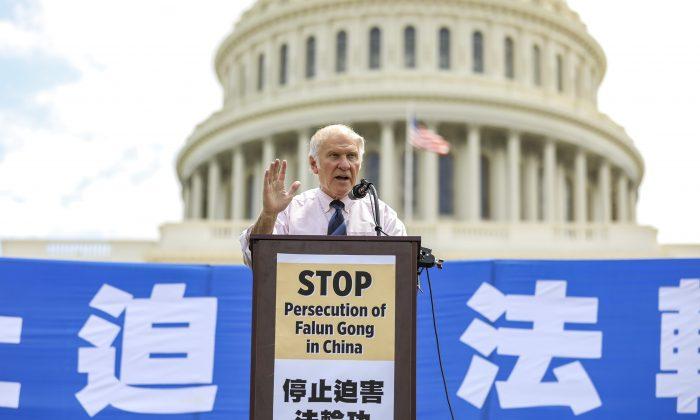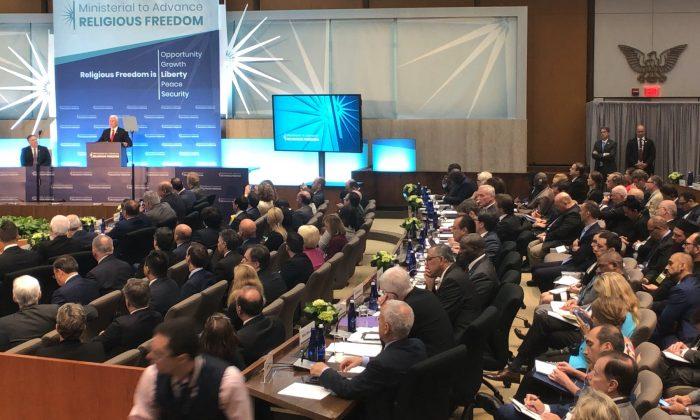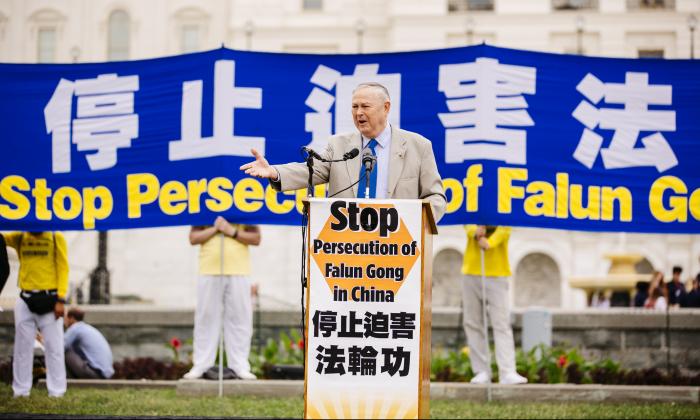WASHINGTON—A third round of high-level trade negotiations between the United States and European Union took place in Washington, D.C., from Dec. 16–20.
Business interests along with the determined support of the Obama administration and the European Union want to expand trade, create new businesses, increase investments, and boost jobs by removing trade barriers on both sides of the Atlantic. They hope the vehicle to achieve that is the Trans-Atlantic Free Trade Agreement (TAFTA).
The preferred name of TAFTA is the Transatlantic Trade and Investment Partnership or T-TIP.
The objective of the T-TIP is to “eliminate all tariffs on trade,” and “boost economic growth in the United States and the EU,” according to a White House fact sheet from the Office of the U.S. Trade Representative (USTR).
Tariffs are one kind of trade barrier discussed, but tariffs are already low, averaging about 4 percent. So the gains expected from enhanced trade will primarily not come from tariff elimination.
These talks seek to find ways to “harmonize” the United States and the European Union’s different sets of regulations that protect health, safety, and the environment and that function in the United States and the European Union. The USTR fact sheet states that negotiations will “tackle costly ‘behind the border’ non-tariff barriers that impede the flow of goods, including agricultural goods.”
On the same day talks resumed, several civil organizations held a telephonic news conference that criticized the T-TIP as a plot to weaken domestic laws that protect consumers and the environment. They consider the pushing for “harmonization” of divergent standards and the elimination of what corporate interests call “trade irritants” as undermining important environmental and consumer safeguards.
The negotiators are well aware of the criticisms. Lead team negotiators Ignacio Garcia Bercero, E.U. Chief Negotiator, and Assistant United States Trade Representative Dan Mullaney addressed some of their concerns at a news conference on the last day of the third round.
Boon to the Economies
The economic relationship between the United States and the European Union is already the world’s largest, accounting for nearly one-half of global economic output, according to the Economic Times. The USTR fact sheet states that 13 million American and E.U. jobs are supported by transatlantic trade and investment. The European Union is already America’s largest export market at $458 billion (in 2012) in goods and private services. There is nearly $3.7 trillion in investment in each other’s economies as of 2011, according to the USTR.
The European Commission advises the European Parliament and Council of European Union, and it does impact studies on its proposals. The Commission favors the T-TIP.
Concerning the T-TIP, the Commission stated in a September 2013 publication, “Reducing regulatory barriers to trade will be one of the most important ways that the Transatlantic Trade and Investment Partnership (TTIP) will help the European and American economies. Studies suggest that between two thirds and four fifths of the gains from a future agreement would come from cutting red tape and having more coordination between regulators.”
The treaty negotiations involve quite complex discussions. At the first meeting in July in Washington, 24 different negotiating groups were set up for working toward a comprehensive trade and investment agreement. The second round was held in Brussels in November. The fourth round will again be in Brussels at dates that are not yet set, but it will be held in early 2014.
It appears that the T-TIP discussions will minimally include automobiles, pharmaceuticals, medical devices, cosmetics, textiles, chemicals, and information and communications technology (ICT). Both sides have indicated an interest in moving forward on these sectors, according to Bercero.
‘Lowest Common Denominator’
Many civil groups and individuals on both sides of the Atlantic are uneasy and pessimistic as they watch the negotiations of the T-TIP from the sidelines. The Sierra Club released a letter, addressed to U.S. Trade Representative Ambassador Michael Froman and European Trade Commissioner Karel De Gucht and signed by nearly 200 civil organizations from both sides of the Atlantic, that questioned the concept of the T-TIP.
On the same day talks resumed, a few these signatories held a telephonic news conference that severely criticized the T-TIP as a sinister plot to undermine domestic laws that protect consumers and the environment.
Robert Weissman, president of nonprofit policy foundation Public Citizen, objected to the key concept in the T-TIP negotiations as stated in the USTR fact sheet: “Tackle costly ‘behind the border’ non-tariff barriers that impede the flow of goods, including agricultural goods.”
Weissman said that the regulatory differences that are said to “unnecessarily impede trade” actually reflect policy differences on both sides of the Atlantic, where typically one side wanted more protection in a particular sector. He worries that the treaty will “impose a single standard for the United States and the European Union and when they do this, it’s going to be the lowest common denominator standard regarding health, safety, and environmental protection.”
Weissman said that TAFTA would “impose very difficult restrictions toward moving toward higher levels of protection over time.”
Further, he sees the “regulatory cooperative council,” proposed by both sides, as a “superagency, non-transparent,” that will impede new regulations in both the United States and the European Union from getting through an already difficult process.
Weissman said it was a “grave concern” that any proposed regulation will be subject to an endless series of impact assessments that very significantly delays and interferes the rule-making process.
Michael Brune, executive director of the Sierra Club, said that some corporations want to see public interest safeguards weakened, such as “chemical safety, GMO labeling, and standards for dirty fossils like tar sands.”
“These rules should be determined by the democratic process … not by a corporate-driven agreement,” Brune said.
Brune was highly critical of the possible enactment of the Investor-State Dispute Settlement (ISDS). According to him, corporations would be allowed “to directly challenge government policies and actions that corporations allege reduce their profits. Such cases would be heard in private tribunals for cash compensations without any limit.”
Brune said emphatically, “Corporations should not be empowered to challenge public interest policies in private trade tribunals.”
Brune said that in existing trade and investment pacts, corporations like Chevron and Exxon Mobile have challenged over 500 policies in 85 sovereign governments to attack public interest policies, such as clean energy, health, labor, and land use. With the T-TIP, a surge of such attacks could be anticipated, according to Brune.
Brune also saw a potential for an increased use of fossil fuels by this agreement from shipping energy from the United States to Europe. The European Union has proposed eliminating a government’s ability to oversee the exports of fossil fuels such as coal, oil, and gas.
Susan Grant, director of consumer protection for the Consumer Federation of America, said that with the increase of commercial and government surveillance, we don’t need at this time a trade deal that would allow personal information to flow across borders without constraints.
“We want data flows to be kept out of the negotiations,” she said.
She added that privacy protections are weaker here than in the European Union, and that we need to strengthen our laws here before embarking with the Eeuropean Union on an agreement concerning data flows.
Defending T-TIP
The European Commission argues that “cutting unnecessary red tape would reduce the cost of doing business across the Atlantic by making it easier for companies to comply with both American and European laws at the same time. Studies suggest this could be worth billions in new growth for our economies.”
Dual regulations are not an insurmountable barrier, according to the Commission. The Commission suggested several ways to approach the problem. One way would be to formally accept that both sides have accomplished the same level of safety. Companies could then comply with one set of rules.
For instance, car safety: While the United States and the European Union have different rules applied to automobile safety, they have “comparable levels of safety.” Even now, it’s possible to drive U.S. cars on European roads under certain conditions.
Mullaney suggested another way to handle the situation: if both sides had equivalent assessment results and would stipulate to that. Then they could “arrive at a point where a product can be tested just once and not twice before it comes into the markets. In other areas it might be a question of sharing information and analyses of products.”
On the last day of the negotiations in the third round, Bercero and Mullaney held a news conference and addressed some of the concerns raised by opponents of the T-TIP.
Bercero said, “We are committed for ensuring that these negotiations will not be about lowering or compromising the highest standards of consumer, environment, privacy, health, or other legitimate protections, and that each side will obviously maintain its regulatory autonomy. The T-TIP is not and will not be about the deregulation agenda.”
Opponents have lambasted T-TIP negotiations for not releasing the text of the negotiating sessions, leaving them to guess what was discussed. Mullaney answered the critics: “We do need … to give the negotiators space to have frank conversations.”
It would be harder to work out compromises if the text were available while negotiations were in progress, added Bercero. He said that by the time of the final ratification by the legislators, everyone will be able to see the agreement proposed.
Mullaney challenged critics’ claim of a lack of transparency. He said in his opening statement that negotiators from the United States and the European Union shared with and listened to, 350 different stakeholders, including environmental and consumer organizations and labor, business, and academia in a three-hour session on Dec. 18.
“These sessions offered the stakeholders an opportunity to provide negotiators valuable feedback on the negotiating objectives for T-TIP as we proceed with these talks,” said Mullaney.
Afterward, Mullaney and Bercero held an hour-and-half briefing session with a large group of stakeholders.




Friends Read Free